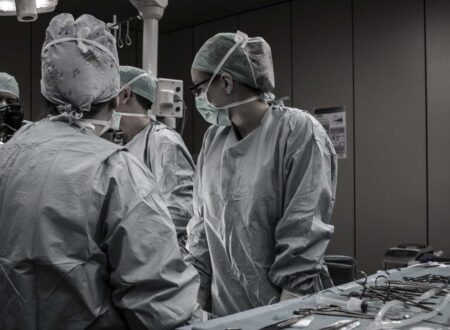The landscape of healthcare is evolving at an unprecedented pace. With each passing day, new technologies emerge that have the potential to revolutionize patient care and streamline medical practices. From artificial intelligence diagnosing diseases faster than a doctor can flip through charts to virtual reality offering immersive therapies, innovation is redefining what we thought was possible in medicine. As we stand on the brink of this exciting future, it’s crucial to explore how these advancements not only enhance our understanding of health but also improve outcomes for patients worldwide. Join us as we delve into the world of medical technology and uncover its transformative power in shaping tomorrow’s healthcare system.
The Importance of Medical Technology in the Healthcare Industry
Medical technology serves as the backbone of modern healthcare. It enhances diagnostic accuracy and streamlines treatment processes, making it easier for professionals to provide high-quality care.
With tools like advanced imaging systems and robotic surgical devices, physicians can visualize complex conditions with remarkable precision. This improvement leads to better decision-making and more effective interventions.
Moreover, medical technology fosters accessibility in healthcare delivery. Telemedicine platforms allow patients in remote areas to receive expert consultations without traveling long distances. Such innovations bridge gaps that once seemed insurmountable.
The integration of electronic health records has transformed data management too. Healthcare providers now have instant access to patient histories, leading to coordinated care efforts that benefit everyone involved.
The role of medical technology is pivotal in shaping a responsive and efficient healthcare system that prioritizes patient outcomes at every turn.
Emerging Innovations: From Artificial Intelligence to Virtual Reality
The landscape of healthcare is evolving rapidly, driven by cutting-edge innovations. One standout area is artificial intelligence. AI algorithms can analyze vast amounts of data, assisting doctors in diagnosing conditions with remarkable accuracy. This technology has the potential to transform patient outcomes significantly.
Virtual reality (VR) also plays a crucial role in modern medicine. It offers immersive training experiences for medical professionals, allowing them to practice surgeries and procedures in a risk-free environment. Patients benefit too; VR helps manage pain and anxiety during treatments by providing distraction and relaxation techniques.
Telemedicine continues to rise as well, making healthcare accessible from anywhere. Patients can consult specialists without geographical barriers, leading to timely interventions.
Each innovation not only enhances efficiency but also redefines how care is delivered—making it more personalized and effective than ever before. The future holds even more possibilities as these technologies continue to advance.
Improved Patient Care: How Medical Technology is Changing the Game
Medical technology is reshaping how we approach patient care in profound ways. With advanced devices and software, healthcare providers can now monitor patients remotely, allowing for timely interventions without the need for constant hospital visits.
Wearable gadgets track vital signs in real-time. This continuous stream of data helps doctors make informed decisions quickly. Patients feel empowered too; they gain insights into their health which fosters a proactive stance towards wellness.
Telehealth has surged, enabling virtual consultations that break geographical barriers. This accessibility ensures more people receive quality care regardless of location or mobility issues.
Moreover, personalized medicine tailored to individual genetic profiles is on the rise. Treatments become more effective as they cater specifically to each patient’s unique makeup.
These advancements not only enhance efficiency but also build stronger relationships between patients and caregivers through consistent communication and support systems.
The Role of Government and Regulations in Advancing Medical Technology
Government and regulations play a pivotal role in the advancement of medical technology. Their influence shapes how innovations are developed, tested, and implemented across healthcare systems.
Through agencies like the FDA, safety standards ensure that new devices and treatments meet rigorous criteria before reaching patients. This process can foster trust among users and providers alike.
Regulations also encourage research funding for groundbreaking technologies. Grants or incentives often guide companies toward areas with pressing needs, such as telehealth solutions or AI diagnostics.
However, it’s a balancing act. Striking the right balance between regulation and innovation is crucial to avoiding unnecessary delays while ensuring patient safety remains paramount.
As technology evolves rapidly, governments must adapt their policies accordingly to keep pace with these developments. This adaptability will be essential in harnessing the full potential of medical advancements for future generations.
Predictions for the Future of Healthcare with Continued Technological Advancements
The future of healthcare is bright, thanks to ongoing technological advancements. We can expect a surge in personalized medicine, where treatments are tailored specifically to individual genetic profiles. This could lead to more effective therapies and better patient outcomes.
Telemedicine will become even more prevalent, breaking down geographical barriers to access quality care. Patients may consult with specialists around the world from the comfort of their homes.
Wearable devices will evolve beyond simple fitness tracking. These gadgets might monitor vital signs continuously and alert healthcare providers in real-time about potential issues.
Artificial intelligence is set to revolutionize diagnostics as well, helping doctors make quicker and more accurate decisions based on vast data analysis.
As technology continues to integrate into everyday health practices, we’ll likely see a shift towards preventative care rather than reactive treatment strategies. The landscape of healthcare is poised for exciting changes that promise enhanced efficiency and improved quality of life for patients everywhere.
Conclusion: The Exciting Potential of Medical Technology in Revolutionizing Healthcare
The potential of medical technology to transform healthcare is immense. As we embrace innovations like artificial intelligence, telemedicine, and virtual reality, the landscape of patient care continues to evolve. These advancements promise not only efficiency but also improved outcomes for patients.
Government regulations play a critical role in this evolution. By ensuring that technologies are safe and effective, they help build trust among practitioners and patients alike. The collaboration between tech companies and healthcare providers is crucial for advancing these tools further.
Looking ahead, the future holds even more exciting developments. Imagine wearables that monitor health continuously or AI systems that predict diseases before symptoms arise. Such possibilities aren’t just dreams; they’re on the horizon.
With each leap forward in medical technology comes new opportunities to enhance our well-being and quality of life. Embracing these changes will pave the way for a healthier tomorrow where innovative solutions are at our fingertips, making it an exhilarating time to be part of the healthcare industry.





